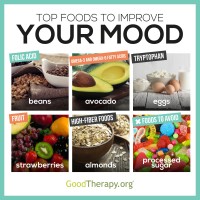 Stress, depression, and anxiety are complex experiences caused by a variety of factors, including lifestyle, brain chemistry, a history of trauma, and health. Research increasingly points to the role nutrition plays in sound emotional health. While eating a bowl of soy beans and loading up on eggs won’t cure depression, it can certainly help. By pairing the right diet with healthy therapy and—if necessary—medication, you can maximize your chances of quickly feeling better.
Stress, depression, and anxiety are complex experiences caused by a variety of factors, including lifestyle, brain chemistry, a history of trauma, and health. Research increasingly points to the role nutrition plays in sound emotional health. While eating a bowl of soy beans and loading up on eggs won’t cure depression, it can certainly help. By pairing the right diet with healthy therapy and—if necessary—medication, you can maximize your chances of quickly feeling better.
Folic Acid
Vitamin B9, also known as folic acid, is probably best known as the nutrient every pregnant woman should eat to prevent neural tube defects. Research also shows that folic acid may help boost mood. One study, for example, found that people with depression tended to be deficient in folic acid. Beans and lentils are excellent sources of folic acid, and you can also get your daily dose of this important nutrient through oatmeal and cereals fortified with folate.
Omega-3 and Omega-6 Fatty Acids
Omega-3 and Omega-6 fatty acids can help improve heart health. Research is still mixed on the effects these fatty acids have on mood, but several studies have shown an improvement in depressive symptoms among people who get high doses of Omega-3 and Omega-6 fatty acids. Even when studies haven’t verified the mood-boosting effects of these fatty acids, they haven’t shown any negative consequences. Fish, nuts, legumes, avocados, flax seed oil, and linseed oil are each high in these important nutrients.
Tryptophan
You might have heard that tryptophan can cause you to doze off after a big Thanksgiving dinner, but it can also help ease anxiety and depression. The body converts tryptophan into serotonin, a neurotransmitter that helps regulate mood and prevent depression. Milk, cheese, eggs, soybeans, tofu, and turkey are all high in tryptophan.
Fruit
There are dozens of reasons to eat more fruit. Fruit’s natural sugars are better for you than the stuff you get from packaged foods, and the relatively low calorie content of most fruits can help you regulate your weight and stave off food cravings. Many fruits can also help boost your mood by boosting serotonin levels. Kiwi, sour cherries, bananas, plantains, plums, pineapples, and tomatoes are each high in serotonin.
High-Fiber Foods
Fiber doesn’t just help you avoid gastrointestinal problems. Some studies have also found that it can boost your mood. High-fiber foods include avocados, whole wheat bread, barley, beans, lentils, almonds, raspberries, pears, oatmeal, and bran muffins.
Foods to Avoid
It can be challenging to eat a healthy diet, and an occasional “cheat” may even boost your mood if you choose something healthy, such as dark chocolate. Some foods can only drag you down, though. These include:
- Alcohol, which is correlated with increased depression and sleepiness.
- Caffeine, which can make you feel jittery and anxious, then lead to sleepiness and depression.
- Processed sugars, which can give a temporary energy boost that quickly yields to a depressive crash.
- Foods containing gluten, especially for those who have celiac disease. Many foods high in folic acid are also high in gluten. Gluten hasn’t been shown to be harmful to most people, but if you have celiac disease, the benefits of gluten-containing foods are outweighed by the risks.
References:
- 15 mood-boosting foods. (n.d.). Retrieved from http://www.prevention.com/food/healthy-eating-tips/food-and-mood-best-foods-make-you-feel-better
- Hainer, R. (2010, June 11). Supplements for depression: What works, what doesn’t. Retrieved from http://www.cnn.com/2010/HEALTH/06/11/supplements.for.depression/
- High-fiber foods. (n.d.). Retrieved from http://www.mayoclinic.org/healthy-living/nutrition-and-healthy-eating/in-depth/high-fiber-foods/art-20050948
- Jefferson, J. W. (2007). Folate for depression. Psychopharm Review, 42(10), 75-81. doi: 10.1097/01.IDT.0000290219.07082.4c
- Nelson, S. (2014, May 19). Study says non-celiac gluten sensitivity may not be real. Retrieved from http://wqad.com/2014/05/19/study-says-non-celiac-gluten-sensitivity-may-not-be-real
- New research reveals that fibre can improve mood. (2002, February 20). Retrieved from http://www.eurekalert.org/pub_releases/2002-02/cu-nrr022002.php
- Treating depression with Omega-3: Encouraging results from largest clinical study. (2010, June 30). Retrieved from http://www.sciencedaily.com/releases/2010/06/100621111238.htm

The preceding article was solely written by the author named above. Any views and opinions expressed are not necessarily shared by GoodTherapy.org. Questions or concerns about the preceding article can be directed to the author or posted as a comment below.



 Breaking Bad Moods: 15 Tips for Shaking the Funk You're In
Breaking Bad Moods: 15 Tips for Shaking the Funk You're In To Thine Own Self Be Kind: 8 Random Acts of Self-Kindness
To Thine Own Self Be Kind: 8 Random Acts of Self-Kindness Feeling Good Yet? Seven Ways to Boost Endorphins
Feeling Good Yet? Seven Ways to Boost Endorphins

Please fill out all required fields to submit your message.
Invalid Email Address.
Please confirm that you are human.
Leave a Comment
By commenting you acknowledge acceptance of GoodTherapy.org's Terms and Conditions of Use.